‘Pluribus’ Star Rhea Seehorn Explains the Secret to Playing the Most Miserable Person on Earth

[This story contains spoilers from the first two episodes of Pluribus.]
The curtain has finally been pulled back on Rhea Seehorn and Vince Gilligan’s highly secretive new series, Pluribus.
In between his commitments to Better Call Saul and El Camino: A Breaking Bad Movie, the Breaking Bad creator was quietly writing a new series for his Saul leading lady, which he casually mentioned to her as she was bidding adieu to Saul’s cast and crew in early 2022. Seehorn, understandably, immediately broke down in tears before accepting the flattering offer. After all, she’d come quite a long way from having only two lines in the 2015 series premiere of the Breaking Bad prequel-sequel.
At the time, it was unclear to Gilligan and his co-creator Peter Gould just how involved her character of Kim Wexler would be in the grand scheme of things. But midway through the series, the pull toward Kim’s doomed romance with Jimmy McGIll/Saul Goodman (Bob Odenkirk) became too great. Their relationship soon took center stage, turning Seehorn into a de facto co-lead. She would conclude the 53-time-Emmy-nominated series with two well-deserved noms of her own.
Shortly after Saul wrapped in August 2022, Gilligan took his Seehorn-led sci-fi series Pluribus to Apple TV, reuniting with Jamie Erlicht and Zack Van Amburg. The co-heads of Apple’s streamer were the first two executives to say yes to Breaking Bad 20-plus years ago, and now the former presidents of Sony Pictures Television were saying yes to at least two seasons of Gilligan’s biggest swing yet.
Seehorn plays Carol Sturka, a misanthropic romance author whose latest book tour concludes with an apocalyptic event that fully transforms her world and the world at large in the span of one evening. Carol is seemingly immune to the extraterrestrial “psychic glue” that has “joined” the global population into a collective hive mind, one that is able to access the thoughts, memories and know-how of anyone and everyone at any given moment.
If it sounds like Gilligan is making a point about AI, something he refers to as a “plagiarism machine,” Seehorn insists otherwise. “[Gilligan] doesn’t write to themes or topics. He doesn’t preach and he doesn’t have agendas. He starts from character and great story,” Seehorn tells The Hollywood Reporter.
Carol — as one of a dozen “old-schoolers” who’s unaffected by “the Joining” — takes it upon herself to get to the bottom of what’s created these extremely friendly, helpful and sensitive people. Seehorn and Gilligan consider her a hero for trying to remedy the situation for the sake of the human race that she once took for granted. But she doesn’t go about her brand of heroism in a conventional way. She’s antagonistic and abusive in a bold creative choice for the same showrunner who frustratingly witnessed the years’ worth of abuse that Anna Gunn endured from certain Breaking Bad viewers, all for having the audacity to play a character who wanted to protect her family from their murderous, meth-manufacturing patriarch Walter White (played by Bryan Cranston).
Both Seehorn and Gilligan have stressed to THR that Carol Sturka is not an attempt to relitigate the Skyler White discourse.
“He just wrote a complex human being that happens to be a woman,” Seehorn says. “However, I’m coming to it as a woman, so the fact that her anger is seen as a source of power — but also something that people are afraid of due its dire consequences — really resonated with me.”
Pluribus’ marketing has even gone as far as describing Carol as the “most miserable person on Earth,” which is technically accurate since virtually everyone else is living under a spell of unified happiness. Even the rest of the old-schoolers seem oddly content with the new harmonious state of the world and rebuff Carol’s efforts to mobilize. But Seehorn learned through Gould on Saul that honesty in any direction leads to the respect of an audience, not shameless pandering.
“I don’t care if [Carol] is having an absolute temper tantrum fit as long as it’s coming from a grounded place,” Seehorn states. “I tried to always look at her as a reluctant normal hero, not a superhuman, who’s been thrust into this incomprehensible world and is taking it step by step. She’s trying to do the best she can in a very confusing situation, and I kept hoping that that would be why somebody would sympathize with her.”
On the surface, Sturka and Seehorn couldn’t be more different. Before the Joining, Carol routinely mocked the fans of her “speculative historical romance literature,” which she herself referred to as “mindless crap.” Contrarily, Seehorn is invariably generous toward her fans, her collaborators from the bottom up and the work that bonds them all. That said, she does see through Carol’s self-deprecation and actually relates to it.
“I don’t think Carol actually hates her work or is embarrassed of her work. She wouldn’t have her book covers framed all around her office if she was,” Seehorn says. “So the way that I identify with Carol is that it can be very scary to believe people when they say that you’re great, because that means you have to believe them when they say you’re a piece of crap.”
Below, during a recent conversation with THR, Seehorn also discusses the moment she realized she was no longer in Kim Wexler’s version of Albuquerque, as well as the demands of being an unequivocal series lead for the first time.
***
I previously asked you about your ponytail prevention haircut, but I didn’t know at the time that the first glimpse of Carol Sturka would be one of those patented shots from behind your head. You had many of those on Better Call Saul to show off Kim Wexler’s trademark ponytail. Did you have a laugh when you found out that Vince wanted to start with that shot again?
Yes, but it was a bit more fun than that because Vince said it hadn’t occurred to him. He was just setting up this tracking shot, and he said some of his favorite iconic reveals of an actor are when you hear their voice before you see their face. So he wanted to do that tracking shot behind me and Matt Credle, my A camera op, who’s an incredible artist himself, was the one doing the tracking shot. Matt not only shot many of those ponytail shots of me on Better Call Saul, but he and I also worked on a shot I devised on the episode of Better Call Saul that I directed [“Hit and Run”] where Kim was moving in her chair, but all you can see is a ponytail wiggling.
So Matt tracked past me [in the opening shot of Carol on Pluribus], and when they called “cut,” I felt this shiver because it hadn’t occurred to me until that moment, “Wow, that’s the first introduction of saying this is not Kim Wexler. We are not in the Albuquerque or the Kansas of Kim Wexler anymore. We’re in this new world.” Matt was then like, “I just got goosebumps.” I was like, “I just got teary.” That’s when we told Vince, and he was like, “Oh, that is cool.” But it wasn’t why he was doing it.
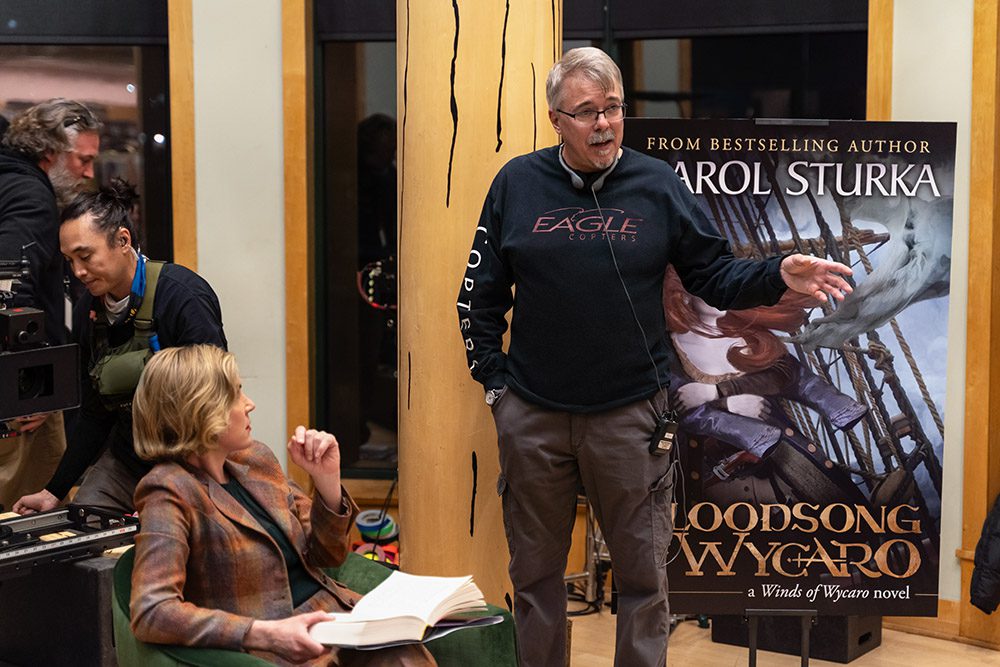
Your Pluribus character is being billed by the marketing campaign as the “most miserable person on the planet.”
What!? Wow, that’s interesting. [Seehorn feigns ignorance for comedic effect.]
How do you fulfill that label while still making sure there’s enough there for an audience to sympathize with her? And I do feel for her, especially as more backstory is revealed.
I’m glad that you do. It’s a great tagline. But Vince clarified something the other day, and I’m an idiot for not having realized this sooner. He was like, “In the new world, after this event happens, she’s quantifiably the most miserable person on earth,” which is fair. But at first I was like, “Is she the most miserable? Or is that kind of hyperbole?”
But the idea of worrying about being likable, I very gratefully was allowed to shed that early on during Better Call Saul. I rehearsed some [Kim-Jimmy] argument scene with Bob [Odenkirk], and it was playing very real. But when we went to film it, I added this smile right at the end, and it was instinctual from some of the shows I’ve done. I’ve done some incredible shows that I am very proud of, but some [other] shows have this onus that they put on the women, particularly, to make sure that they’re likable and never too threatening to the male in the scene. So I didn’t even realize that the smile came out of me, and I said, “Oh my God, I’m sorry. It’s just a bad habit. What a terrible habit.”
[Saul co-creator] Peter Gould said, “I liked the scene better when she doesn’t let him off the hook. She has every right to walk out and let him stew in what she just said.” And I said, “I think I was stupidly thinking of being likable.” And he said, “If you choose what Kim’s ethics and morals are — and she is authentic to herself and honest about that — then that’s what the audience will respect and want to follow. It isn’t about being palatable. It isn’t about being sweet or demure or kind or gentler. Let her be honest in the scene.”
So, these days, I redefine my search for being likable as my search for being the access point, especially when I’m playing a character that is the audience’s way in [like on Pluribus]. I need to find identifiable human moments. I don’t care if [Carol] is having an absolute temper tantrum fit as long as it’s coming from a grounded place. We’ve all been in places where we were the person yelling into the void, saying, “Does anybody else think there’s something wrong with this? Are we just going to sit here and pretend like nothing is going on?”
And many of us, sadly, have been in a state of absolute despair while grieving someone, which is its own type of temporary insanity. So I just tried to always look at her as a reluctant normal hero, not a superhuman, who’s been thrust into this incomprehensible world and is taking it step by step. She’s trying to get up off the floor and do the best she can in a very confusing situation, and I kept hoping that that would be why somebody would sympathize with her.
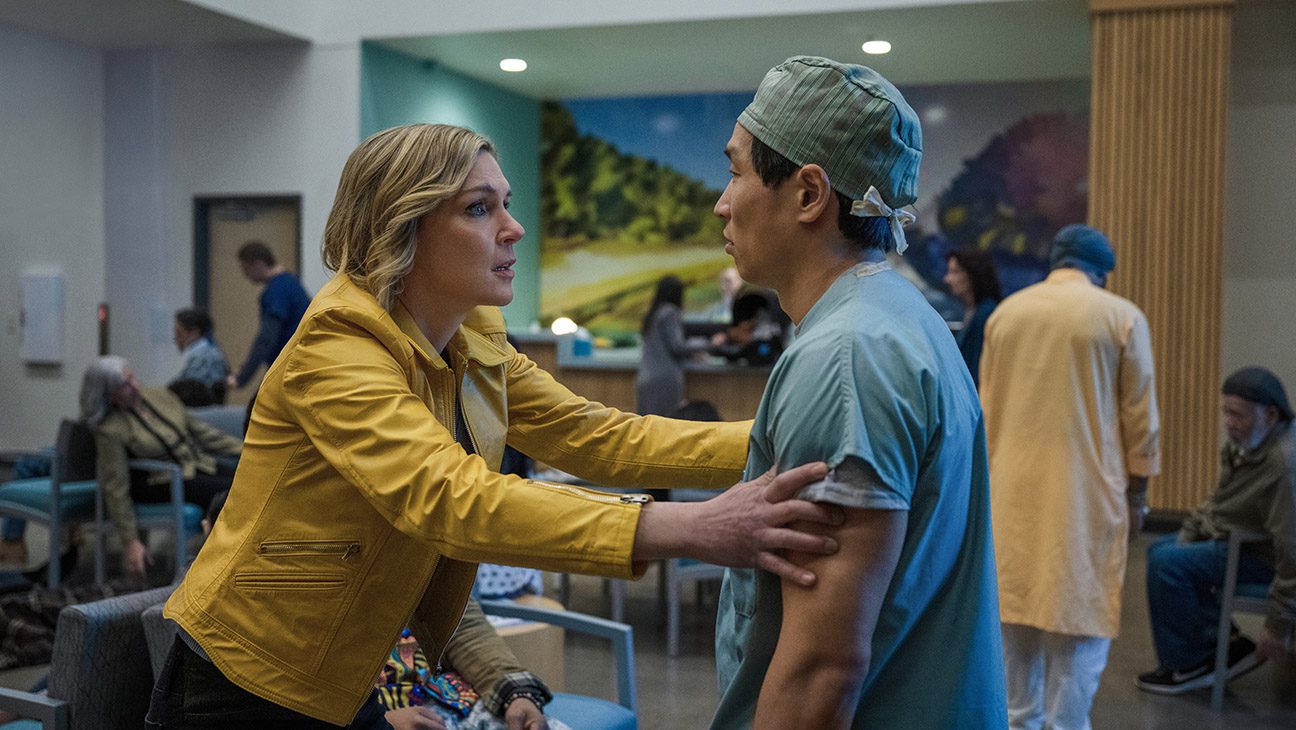
We’ve previously discussed the way Anna Gunn and her Breaking Bad character were mistreated by certain viewers. It was a subject of much frustration for Vince and co. So, as I told him, I really respect the fact that he was unafraid to tackle another complex female character in Carol. Did you ever sense that Vince still had something to prove on this subject?
Not at all. To tell you the truth, he doesn’t write to themes or topics. We’re getting a lot of questions from people wondering if this is a particular commentary on something that’s going on topically in the world, be it AI or politics or religion. And Vince truly does not write to themes. He doesn’t preach and he doesn’t have agendas. He starts from character and great story. He’s certainly writing while living in the world we’re living in now, and so you’re going to receive the story from someone who lives in this world right now.
Vince has said that he has only ever written male protagonists as his leads, and when he decided that he wanted to write something for me, he made this lead a female protagonist. But I’d be willing to bet that he did not sit down and say, “Well, I better write what women would do and how women would behave in a scene.” I think he just wrote a complex human being that happens to be a woman. However, I’m coming to it as a woman, so the fact that her anger is seen as a source of power — but also something that people are afraid of due its dire consequences — really resonated with me.
I remember asking Vince about it at one point. It’s just that he’s writing story and character, and he can’t wait for you to interpret it as you would interpret it. So I do not think he had any kind of agenda where he said, “I’ve got something to say about X, Y, or Z.”
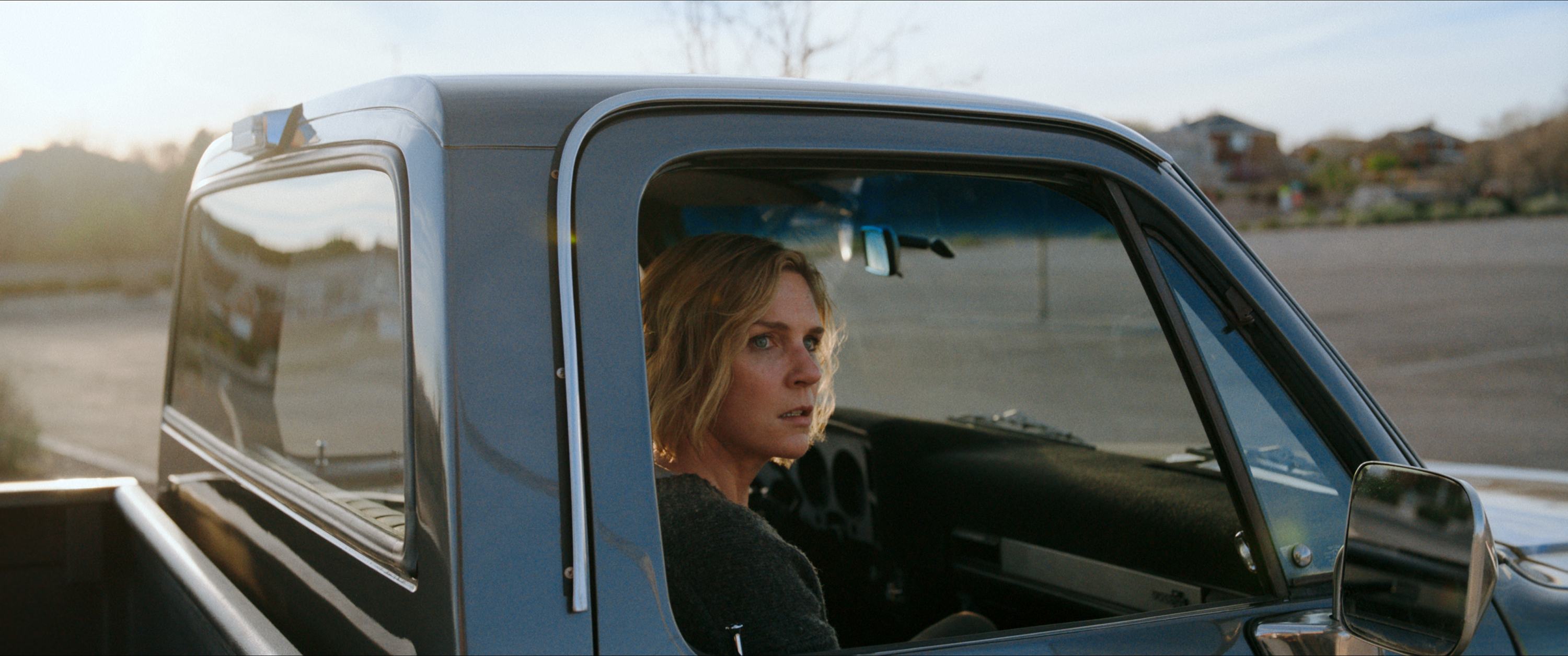
Admittedly, I did ponder readings involving AI and political division, but I also thought a lot about how isolating celebrity can be. There’s always someone around the corner who’s eager to please you. Carol’s book signing before the world-altering event is really a microcosm of what would soon become the macrocosm.
Oh, yeah! That’s a good point.
So it’s interesting that there was no conscious intent to force-feed anything.
Not at all. You can choose to believe me or not, but I’m not being evasive. He just doesn’t write that way. If we’re lucky enough that people love the show and it’s a hit — and then there’s that second round where people rediscover it years later — I hope it’s timeless, because it isn’t direct commentary about something topical. At its baseline, it’s about human nature right now. We’re all on this planet dealing with the way the world is, and that’s what we’re grappling with.
But I’m not surprised that there’s been quite a few journalists who have asked me about AI, because it’s got to be something you guys are grappling with. “Where’s my job? Will great writing remain an art form? Or is it something that, with the right equation, you can do just as well [with AI]?”
Carol is grappling with that. She was striving to be a great writer, but she’s made a hobby out of picking at it and even mocking her fans, which is really her own self-loathing. To say she’s a great writer, it’s like, “Well, then there must be something wrong with you.” She’s now stuck in this place of, “What if everybody was just as good a writer? Everything’s now equal.” I suppose that’s a utopia to some people, but to the rest of us, it would be like, “Well, what am I striving for today [now that everyone is on the same level]? Before, I was trying to be better and better at what I set out to do.”
Carol is a very successful writer who’s ashamed of the work that’s become her calling card. Conversely, you’re a very successful actor who’s, presumably, immensely proud of her work. So how much overlap were you able to find between you and her?
I’m proud of the work I’ve been allowed to be a part of, but it’s only recently that I’ve gotten to a place that’s an incremental change from being absolutely self-deprecating and acting like it’s an absolute fluke. Every set I’m on, I’m like, “I must have won some contest.” That’s why I was giggling when you said I’m immensely proud of my work. It’s hard to look at myself objectively that way. But I should at least show up to set and to these interviews thinking I am somewhat value added. Otherwise, I’m just insulting your intelligence for wanting to talk to me about this. I’m also insulting Vince Gilligan’s intelligence for wanting to write a show for me, and I’m insulting fans for really liking my work. So I thank everyone for that.
But I don’t think Carol actually hates her work or is embarrassed of her work. She wouldn’t have her book covers framed all around her office if she was. I think she’s doing a great job at what she’s doing, but to her, it’s like, “Well, a really smart person would be doing work that matters.” So she wants to beat you to the punch to call her work popcorn fare. She’ll make fun of it first, but I think she’s totally proud of her work. So the way that I identify with Carol is that it can be very scary to believe people when they say that you’re great, because that means you have to believe them when they say you’re a piece of crap.
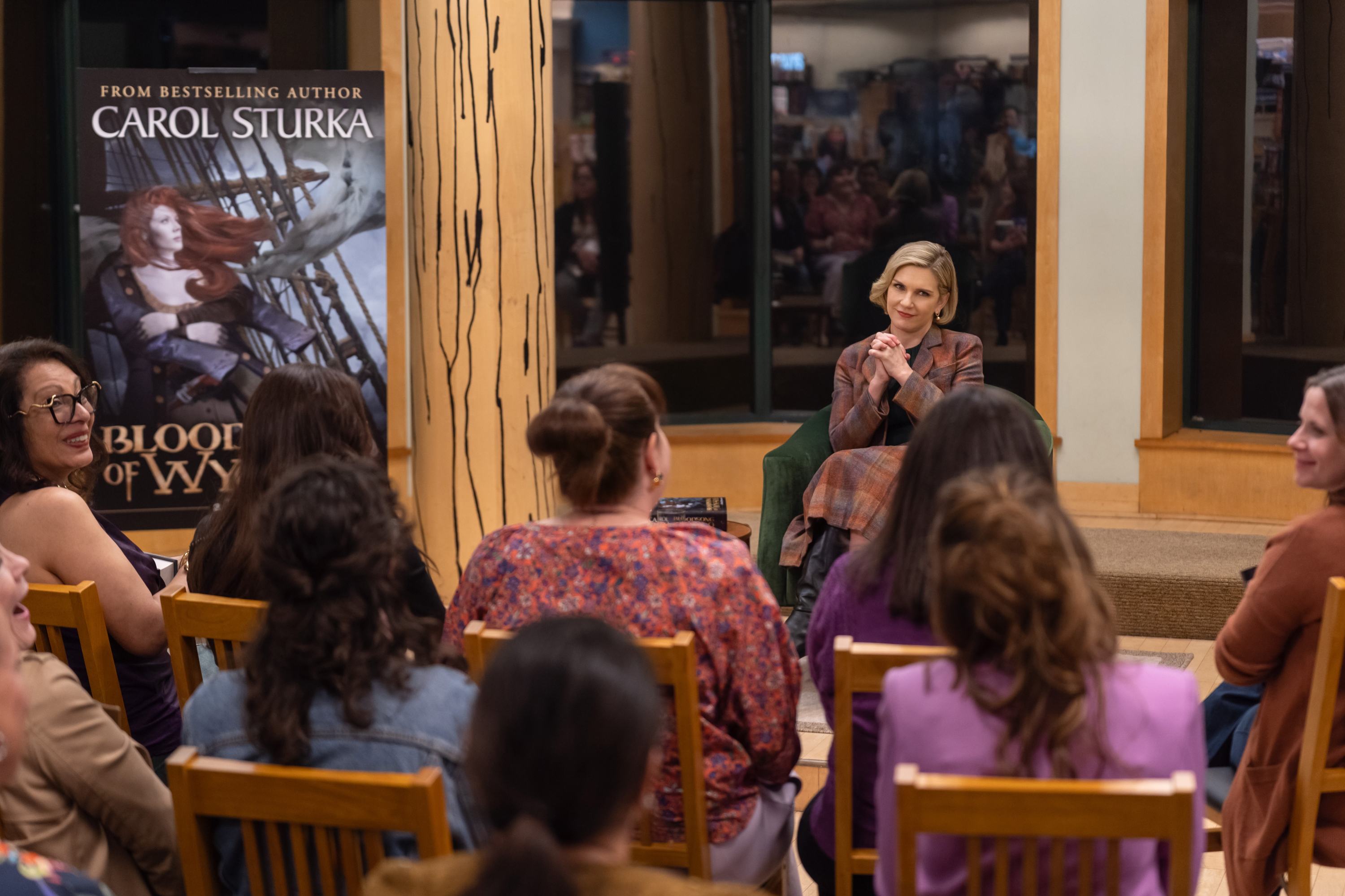
You’ve been saying since the first announcement in 2022 that Pluribus has no connection whatsoever to Better Call Saul, so were you eventually surprised that Vince and co. were still willing to insert some Better Call Saul and Breaking Bad Easter eggs?
A little bit, but they’re very subtle. They’re not send-ups of any of his other shows. They’re more like these constant wonderful rewards for his most perceptive viewers.
The marketing has emphasized the line, “Hello, Carol,” and that same line was a major moment from Breaking Bad’s final season premiere (“Blood Money”).
(Laughs.) I didn’t even realize that. I’m the dingdong who doesn’t even pick up on all these things.
It’s what Walter White said when he, as Mr. Lambert in a flash-forward, crossed paths with his frightened neighbor named Carol during his return to his condemned house. [Writer’s Note: Walter repeated the same line under opposite circumstances in the same episode’s primary timeline.]
Oh, that’s awesome. See, I just know Carol Sturka’s name is an homage to our beloved Carol Burnett. [Writer’s Note: Walter White’s neighbor was also an homage to Carol Burnett, long before Gilligan became friendly with Burnett and offered her a pivotal role on Better Call Saul’s final season.]
The majority of Pluribus’ series premiere, “We Is Us,” plays like a big-budget disaster-horror movie, and there’s no shortage of cinematic sequences throughout the rest of the season. The show also shoots all over the world. Did the scale of this feel dramatically larger than Saul?
The scope is definitely larger. You have the sci-fi element, and you have all these background people doing a tremendous job. On Breaking Bad and Better Call Saul, you’re always creating a world. You’re world building to say, “Here’s what I’m setting up as the given circumstance, and here are these people and the rules of how they’re going to operate within this system.”
So this one was additional because we start you in one world and then we show you how the world has changed. So we had to do everything we could to set up what the norm is so that anybody can figure out what the changes are. But then you are coming at it through Carol’s point of view, and she doesn’t understand everything all at once. It’s coming at her too fast.
The pilot is almost all exteriors at nighttime, and that means night shoots. So it’s this one apocalyptic evening that took weeks and weeks to shoot, and it did feel like its own little movie. The scope and task of it did feel bigger, as well as how physical it was. But I’m sure Bob Odenkirk felt that way at times when he was in scenes back to back to back. It feels breathless. I’m sure Bryan Cranston and Aaron Paul and many of the other cast members have felt that way. But Pluribus’ series premiere feels like a night of horrors that’s unending. That’s for sure.
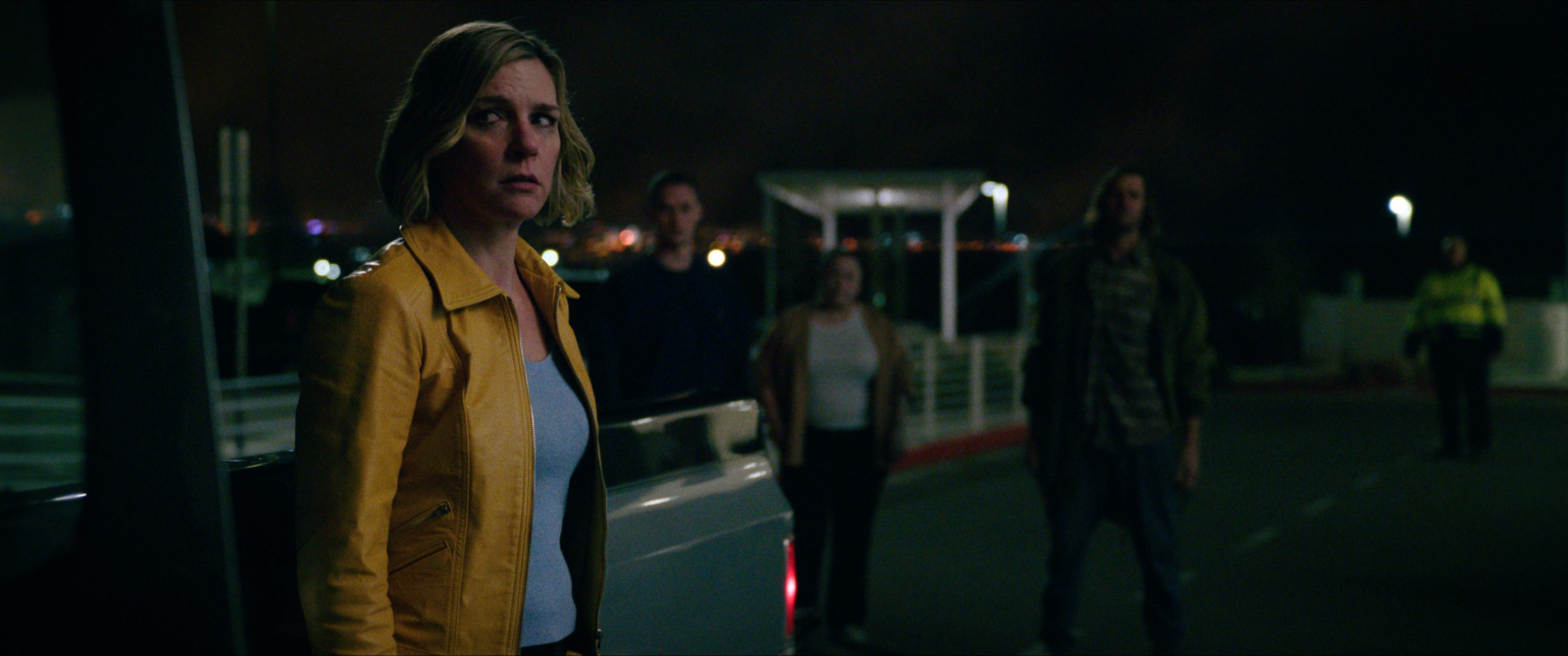
You referenced your directorial work on Saul earlier, and it’d be interesting to see you get back in the chair on Pluribus season two. But given how small the regular cast is, it would probably have to happen under very specific circumstances. Has that subject been broached yet?
Only by journalists and fans. I’m not there yet. There’s no way I could have done it during this first season. It wouldn’t have been physically possible. There just weren’t enough hours in the day.
The crew, department heads and AD staff did everything they could to make sure I could get enough sleep and have time to review lines that I had already memorized and read a new script that had come in and prep and get to a fitting. There were certain lessons and stunt rehearsals I needed to do.
I also made sure I rehearsed with anybody who had lines with me. Unless you had me chained up somewhere and it’s physically impossible, I don’t think it’s fair for an actor to come straight from their hotel and say their lines out loud for the first time when they call action. I want them to know the scene is only as good as we both are together.
So I don’t know how I could have directed, and I have no idea what Vince has in store for season two. I’d be interested in directing again, but if it’s not on this show, then somewhere else. I’m just not sure that I want to direct on this. It’s full RAM space right now for me to do the performance, which I do prioritize. But one of the pluses is that I would have the safety net of this crew that always lifts me up, so I’ll have to see down the road.
***
Pluribus’ two-episode series premiere is now streaming on Apple TV, followed by new episodes every Friday.
HiCelebNews online magazine publishes interesting content every day in the TV section of the entertainment category. Follow us to read the latest news.





